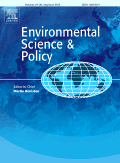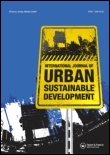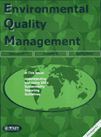
ENVIRONMENTAL SCIENCE & POLICY
Scope & Guideline
Innovating solutions through interdisciplinary research.
Introduction
Aims and Scopes
- Interdisciplinary Research:
The journal encourages contributions that integrate various disciplines, such as ecology, economics, sociology, and political science, to address environmental challenges comprehensively. - Stakeholder Engagement and Participation:
Papers often explore the role of various stakeholders, including local communities, indigenous peoples, and policymakers, in environmental governance, emphasizing the importance of participatory approaches. - Climate Change and Adaptation Strategies:
A significant focus is placed on research related to climate change, including adaptation strategies, resilience building, and mitigation efforts across different sectors and regions. - Policy Analysis and Development:
The journal publishes studies that analyze existing environmental policies, propose new frameworks, and assess the effectiveness of policy implementation in achieving sustainability goals. - Social Equity and Environmental Justice:
There is a strong emphasis on examining social equity issues within environmental governance, ensuring that marginalized voices are heard, and addressing inequalities in environmental impacts. - Nature-Based Solutions:
The journal highlights innovative approaches such as nature-based solutions that leverage natural processes to address environmental challenges while providing social and economic benefits.
Trending and Emerging
- Climate Justice and Equity:
There is a growing emphasis on climate justice, with research focusing on how climate change disproportionately affects vulnerable populations and the need for equitable solutions in policy-making. - Integration of Indigenous Knowledge:
Increasingly, studies are highlighting the importance of integrating indigenous knowledge systems into environmental governance, recognizing their value in managing natural resources sustainably. - Digital Tools and Technologies:
The use of digital tools, data analytics, and artificial intelligence in environmental decision-making is trending, as researchers explore how these technologies can enhance policy effectiveness and public engagement. - Resilience and Adaptation Frameworks:
Emerging research is focusing on resilience frameworks that help communities adapt to environmental changes, particularly in the context of climate-induced impacts on livelihoods and ecosystems. - Nature-Based Solutions:
There is an increased interest in nature-based solutions as innovative strategies for addressing climate change and environmental degradation, emphasizing their dual benefits for ecosystems and human well-being. - Food-Water-Energy Nexus:
Research examining the interconnections between food security, water resources, and energy consumption is gaining traction, reflecting a holistic approach to sustainability challenges.
Declining or Waning
- Traditional Environmental Management Approaches:
There appears to be a waning interest in conventional top-down environmental management strategies. The focus has shifted toward more collaborative and participatory frameworks that engage stakeholders at all levels. - Narrowly Focused Technical Studies:
Papers that focus solely on highly technical studies without a clear connection to policy implications or broader societal impacts are becoming less frequent, as the journal seeks to prioritize work that informs practice and policy. - Single-Domain Research:
Research that examines environmental issues in isolation, without considering interdisciplinary connections, is declining. The journal increasingly values integrated approaches that encompass social, economic, and ecological dimensions. - Policy Prescriptiveness:
There is a noticeable decrease in papers that advocate for specific prescriptive policies without robust evidence or stakeholder input, as the journal emphasizes the need for evidence-based, context-sensitive policy recommendations.
Similar Journals

International Journal of Urban Sustainable Development
Shaping policies for a greener, smarter urban landscape.The International Journal of Urban Sustainable Development is a premier peer-reviewed journal published by Taylor & Francis Ltd, dedicated to advancing knowledge in the field of urban sustainability. With an ISSN of 1946-3138 and an E-ISSN of 1946-3146, this journal has gained recognition for its high-quality research, attaining Q1 status in multiple categories including Development, Geography, Planning and Development, and Urban Studies, per the 2023 category quartiles. Open Access since 2022, the journal ensures that groundbreaking research is widely accessible to scholars, practitioners, and policy-makers alike, enhancing its reach and impact. Operating from the United Kingdom, it focuses on a diverse array of topics related to urban environments and sustainable practices, supporting innovation and policy development. As a result, the journal holds significant placements in Scopus rankings, notably ranking #62 in Urban Studies, underscoring its pivotal role in shaping the future of sustainable urban development globally.

Nature Climate Change
Pioneering Research at the Intersection of Nature and SocietyNature Climate Change, published by NATURE PORTFOLIO, is a leading peer-reviewed journal in the fields of Environmental Science and Social Sciences. Established in 2011, this journal has garnered significant acclaim, with an impressive impact factor reflected in its 2023 Q1 ranking in both categories, making it rank #1 in Environmental Science (miscellaneous) and Social Sciences (miscellaneous), placing it in the 99th percentile. The journal aims to provide a comprehensive platform for the latest research and developments related to the social, economic, and environmental dimensions of climate change, thus fostering interdisciplinary dialogue and collaboration. Researchers, professionals, and students alike benefit from the journal's commitment to addressing the urgent challenges posed by climate change through innovative research, reviews, and commentary. Although not open access, the journal remains pivotal in shaping global discussions and policies surrounding climate issues. For those seeking indicative research trends and influences in climate change scholarship, Nature Climate Change serves as an essential resource that highlights innovative solutions and actionable insights.

Wiley Interdisciplinary Reviews-Climate Change
Exploring innovative solutions to pressing climatic challenges.Wiley Interdisciplinary Reviews-Climate Change is a leading peer-reviewed journal published by WILEY, focusing on the multifaceted aspects of climate change, its impacts, and potential solutions. With an ISSN of 1757-7780 and an E-ISSN of 1757-7799, this journal has established itself as a vital resource for researchers and professionals addressing pressing climatic issues. Boasting an impressive 2023 impact factor, it holds a Q1 ranking in prestigious categories such as Atmospheric Science, Geography, Planning and Development, and Global and Planetary Change. With a significant global reach, it ranks 6th in Social Sciences and 3rd in Earth and Planetary Sciences within Scopus metrics, emphasizing its relevance and high-quality contributions. The journal promotes interdisciplinary research that bridges science, policy, and societal responses to climate change, making it an essential platform for advancing knowledge and informing practice in the field. Researchers, students, and professionals are encouraged to engage with and contribute to this esteemed publication, which continues to shape the dialogue surrounding climate change from 2010 to 2024 and beyond.

Policy Design and Practice
Advancing policy through innovative research.Policy Design and Practice, published by Taylor & Francis Ltd, stands at the forefront of the fields of Political Science and Public Administration. Since its inception as an Open Access journal in 2018, it has played a pivotal role in disseminating cutting-edge research that informs effective policy-making and implementation. With a commendable impact factor reflected in its Q1 rankings for both Political Science and International Relations, and Public Administration in 2023, the journal is ranked among the top 1% of publications in these disciplines, with Scopus Ranks placing it 5th in Political Science and 9th in Public Administration. By offering unrestricted access to articles, Policy Design and Practice endeavors to bridge the gap between academic research and practical application, making it an invaluable resource for researchers, practitioners, and students alike. As it continues to grow alongside the evolving landscape of policy design, this journal remains a crucial platform for scholarly dialogue and innovation.

ENVIRONMENTAL MANAGEMENT
Driving change through evidence-based environmental strategies.ENVIRONMENTAL MANAGEMENT, published by Springer, stands at the forefront of advancing sustainability and ecological stewardship in the fields of Ecology, Global and Planetary Change, and Pollution. With an impressive tracking history from 1977 to 2024 and prestigious quartile rankings reflecting its significant impact (Q1 in Ecology and Q2 in both Global and Planetary Change and Pollution), this journal engages a wide range of stakeholders, including researchers, policymakers, and environmental professionals. The journal is a vital resource for those dedicated to addressing pressing global environmental challenges, publishing rigorous interdisciplinary research that informs policy and practice. While it does not offer open access, its content remains accessible through institutional subscriptions. Located in the heart of New York, ENVIRONMENTAL MANAGEMENT is dedicated to fostering a substantive dialogue on innovative approaches to environmental preservation and management.

Environmental Sciences Europe
Empowering researchers for a cleaner, greener Europe.Environmental Sciences Europe is a leading peer-reviewed journal published by SPRINGER, dedicated to advancing research in the field of environmental science, with a specific focus on pollution and its mitigation. Since its transition to Open Access in 2011, the journal has been committed to disseminating high-quality research without barriers, thereby ensuring that critical knowledge is freely accessible to researchers, practitioners, and policymakers around the globe. Based in Germany and with a commendable Q1 ranking in Pollution for 2023, the journal stands out in the Scopus rankings, occupying the 23rd position out of 167 in its category, reflecting its significant impact in shaping environmental discourse. With a convergence of global research efforts projected until 2024, Environmental Sciences Europe aims to provide a vital platform for scholarly communication and collaboration, ultimately contributing to sustainable solutions for pressing environmental challenges.

ECOLOGY LAW QUARTERLY
Exploring the nexus of law and environmental stewardship.ECOLOGY LAW QUARTERLY is a distinguished journal published by the University of California, Berkeley School of Law, focusing on the intersection of environmental law and ecological science. With a commitment to exploring critical legal and policy issues surrounding environmental protection and sustainability, this journal aims to provide a platform for innovative research and discourse. Though it holds an impact factor reflective of its Q4 in Environmental Science and Q3 in Law category quartiles, it remains a significant resource for legal scholars and practitioners alike, offering insight into contemporary legal challenges in environmental contexts. The quarterly has adapted to evolving academic standards since its inception in 1973, continuing to publish vital research that shapes policy and legal frameworks. Interested academics and practitioners can access the journal's content through the university's archives, ensuring a repository of knowledge crucial for advancing the fields of law and environmental science.

ENVIRONMENTAL QUALITY MANAGEMENT
Innovating Insights for a Healthier PlanetENVIRONMENTAL QUALITY MANAGEMENT is a respected journal published by WILEY, focusing on interdisciplinary studies that merge environmental science with public health, management, policy, and law. Since its inception in 1991, this journal has provided a platform for researchers and practitioners to share innovative insights and advancements in understanding environmental quality and its impacts on human health and the ecosystem. With an ISSN of 1088-1913 and an E-ISSN of 1520-6483, it holds a significant position in the academic community, evidenced by its presence in the Q3 quartile across several categories, including Management, Monitoring, Policy and Law, as well as Pollution and Waste Management. Although it is not an open-access journal, it continues to be a vital resource for those in the environmental sector, offering robust evaluations and discussions that advance knowledge and foster improved practices. With Scopus rankings demonstrating its relevance among other titles in the field, ENVIRONMENTAL QUALITY MANAGEMENT plays a crucial role in shaping discourse and informing policy in an increasingly vital area of study.

Journal of Environmental Studies and Sciences
Illuminating the path to sustainable development.Journal of Environmental Studies and Sciences, published by SPRINGER, serves as a pivotal platform for advancing the field of environmental science and related disciplines. With an ISSN of 2190-6483 and E-ISSN of 2190-6491, this esteemed journal has established itself as a reputable source of knowledge since its inception in 2011. Covering an expansive range of topics related to environmental studies, the journal has achieved a commendable position within the academic community, evidenced by its 2023 category quartiles, ranking in the Q2 tier for both Environmental Science (miscellaneous) and Geography, Planning and Development. The journal's Scopus rankings further highlight its impact within the fields of Geography, Planning and Development, and General Environmental Science, boasting a respectable percentile rank of 69th and 58th respectively. Although it does not currently offer Open Access, the Journal of Environmental Studies and Sciences remains an essential resource for researchers, professionals, and students aiming to explore critical environmental issues, engage with innovative research, and contribute to sustainable development practices. Its ongoing commitment to academic rigor ensures that it continues to play a vital role in shaping the discourse around environmental challenges and solutions.

Journal of Environmental Policy & Planning
Shaping the Dialogue on Environmental Policy and PracticeJournal of Environmental Policy & Planning, published by ROUTLEDGE JOURNALS, TAYLOR & FRANCIS LTD, is a leading interdisciplinary journal dedicated to advancing the understanding of environmental policy and planning. With an ISSN of 1523-908X and an E-ISSN of 1522-7200, this esteemed journal has been instrumental in disseminating cutting-edge research since 1999. As a member of the prestigious Q1 category in Management, Monitoring, Policy and Law for 2023, it ranks #86 out of 399 in the Scopus database, placing it in the 78th percentile, which underscores its significant impact on the field. The journal's rigorous publication standards ensure that it serves as a vital resource for researchers, practitioners, and students interested in environmental governance, policy analysis, and strategic planning. While not currently operating with an open-access model, the journal maintains a commitment to scholarly excellence and societal impact through its in-depth analyses and innovative approaches to pressing environmental challenges. Based in the United Kingdom, it aims to foster dialogue and collaboration among scholars and professionals alike, making it a cornerstone for anyone engaged in the evolution of environmental policies.